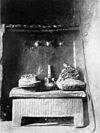The ofo is a staff carried by selected Igbo leaders — notably patrilineage priests, kings, onyishi, and some masqueraders — that signifies authority, the right to command, administrative powers, and/or the conferment of leadership and power bestowed by the gods..It is typically six to seven inches long and made of bronze, brass, or wood.
Vernantius Emeka Ndukaihe wrote in his book "Achievement as Value in the Igbo/African Identity: The Ethics”, in the section The ‘Ofo’ as a sacred symbol of worship: "The most important 'Ofo' is the lineage 'Ofo', believed to have been acquired by the founder of the 'Umunna' (family lineage group), as the head. At the death of such a head, the next 'Okpara' (first male child) inherits it. So it goes, handed from generation to generation. There is also the personal 'Ofo'. A young man acquires his first 'Ofo' when he is initiated into his first 'Ozo' (a sacred institution reserved for the honorable elders of the community) title. As one advances into the more senior 'Ozo', one acquires the corresponding 'Ofo'. Thus, to possess 'Ofo' is a symbol of great social, religious and moral achievement. The individual 'Ofo' of the 'Ozo' titled man can only be inherited by his eldest son after burial rites have been completed. It is regarded a calamity when a dead father has no son to inherit his 'Ofo'".
Ogu
The ofo is often accompanied by an ogu, a shorter stick tied with palm leaves to represent peace and innocence. The ogu serves as a symbol to indicate a desire for a peaceful resolution to a dispute. When the parties involved in a dispute fail to agree on a resolution, the ogu is put away and the ofo is displayed in its place, to indicate an escalation.
Nsukka culture
In Nsukka cultural settings, the ofo is often referred to as the ohoo and is made using wood from the ukwu ohoo tree. It is used exclusively by the onyishi (village elder) as both a symbol of identity and a symbol of worship, since an onyishi often prays with the ofo/ohoo in hand.
Associated powers
The ofo grants the bearer the right to:
- Offer sacrifices
- Perform rituals
- Make prayers
- Swear oaths
- Pronounce judgement
- Deliberate policy within the family, clan or community, and
- Invoke blessings or curses.
Because of its cultural significance to the Igbo people, the ofo may be handled only by those who are authorized (or otherwise entitled) to wield it. It is treated as an heirloom to be passed from generation to generation.
In the words of art historian Nancy Neaher Maas, the ofo also serves as to symbolize the collective power of the gods and ancestors, as well as the truths given by Chineke (or God Almighty) to a person. The ofo is believed to link its owner to their ancestors. Whatever one prays for, while holding the ofo and stamping it to the ground, is believed to be established.
Link to Chineke
The ofo is believed to symbolize the link that exists between its owner's people and Chineke. It is a channel between the living, the dead, and those yet to be born. The ofo therefore plays a role in prayer, ritual sacrifice, contact of spirit patrons, magic, naming ceremonies, determining schedules of events, affirming moral uprightness, sealing covenants, legitimizing states or offices, making decisions, settling disputes, taking oaths of administration, and promulgating and enforcing laws.
General Ofo
The General Ofo of Igboland is currently located in the palace of Gad in Agulueri, Anambra State.
Modern usage
The Ofo is still utilized, although the spread of Christianity and colonization has reduced its significance. Today, while less common, many Igbo traditional rites and ceremonies still use the ofo and believe in its efficacy.
References
- "Ofo as a Global Cultural Resource and Its Significance in Igbo Culture Area". Retrieved 2015-09-16.
- "Ofo, a small stick that performs wonders in Igboland". Vanguard News. 2021-04-07. Retrieved 2022-08-11.
- Ndukaihe, Vernantius Emeka (2006). Achievement as Value in the Igbo/African Identity: The Ethics. LIT Verlag Münster. p. 196. ISBN 3825899292. Retrieved 2015-03-28.
- Refugees, United Nations High Commissioner for. "Refworld | Nigeria: The Igwe of Nnewi-Chi; links to the Ofo shrine in Nkwo-Nnewi; the name of the ruler, rituals practised, and the tradition for selecting a chief". Retrieved 2015-09-16.
- "Religion and the Civilizational Process: The Civilizing Role of Religion in the Socio-Political Decision Making Process in Pre-colonial Ibo Community of Nigeria". ResearchGate. Retrieved 2015-09-16.
- Onwutalobi, Anthony-Claret. "Nnewi Monarchy - The Official Nnewi City Portal". www.nnewi.info. Retrieved 2015-09-16.
- Njaka. sfn error: no target: CITEREFNjaka (help)
- Ejizu 1999. sfn error: no target: CITEREFEjizu1999 (help)
- "Ọfọ na Ogu, meaning and significance". Obinwannem News. Retrieved 20 November 2021.
- Chimaobi, Vladimir. "Ọfọ na Ogu, meaning and significance". Retrieved 2021-11-01.
| Odinala | ||
|---|---|---|
| Establishments |  | |
| (Primary) Arusi | ||
| Concepts | ||
| Topics | ||
| Sacred places | ||
| Derivatives | ||